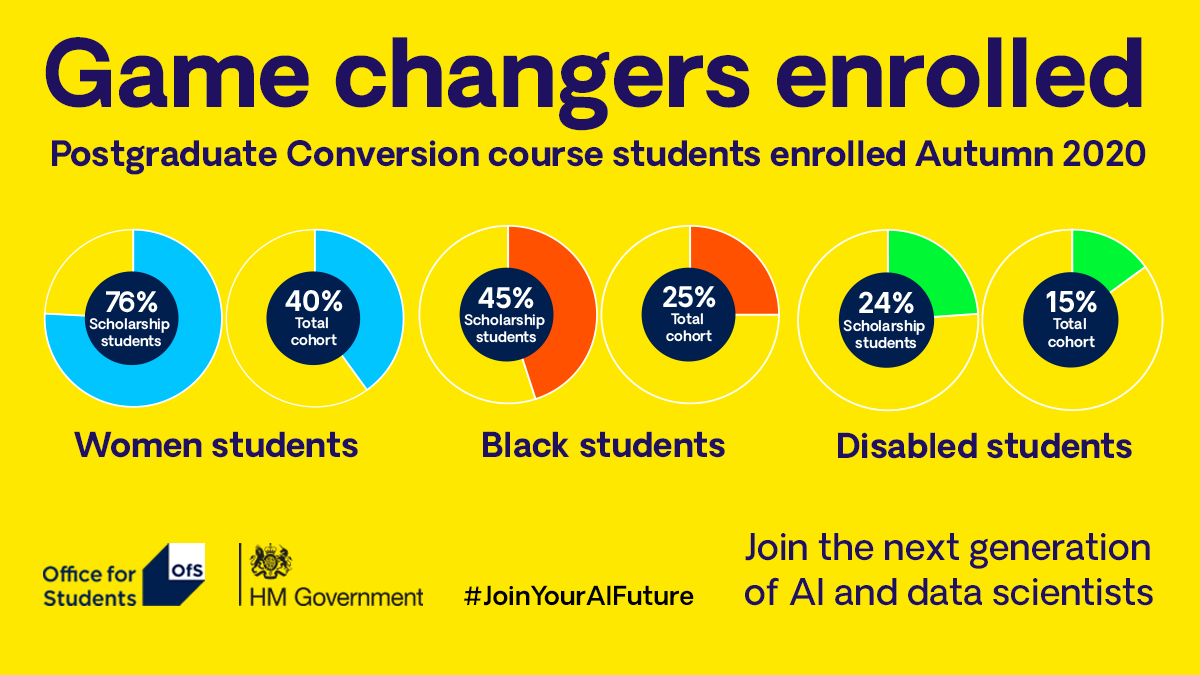New autumn 2020 student admissions data shows a diverse range of students have enrolled on artificial intelligence (AI) and data science postgraduate conversion courses funded by the Office for Students (OfS).

The data shows that 40 per cent of the total students are women, one quarter are Black students and 15 per cent are students are disabled.
Eighteen universities across England secured £13 million funding from the Department for Digital, Culture, Media and Sport (DCMS), the Department for Business, Energy and Industrial Strategy (BEIS) and the Office for Artificial Intelligence (OAI) to broaden the talent and to respond to a skills shortage in the tech sector, which is currently costing businesses £2 billion a year. Thirteen universities began enrolling students on these courses this autumn.
The funding included 1,000 scholarships worth £10,000 each for underrepresented groups, and a paid work placement available as part of each course. This aimed to improve graduate employability across England, and to support students to manage work and caring responsibilities alongside their studies.
Scholarships were particularly targeted towards women, Black students and disabled students - with these groups inadequately represented in the industry. Just over one in five (22 per cent) of the total first student intake were awarded a scholarship. Of these, 76 per cent of scholarship students were women, nearly half (45 per cent) were Black students and almost a quarter (24 per cent) were disabled students.
Scholarships are also available for students from the following groups:
- students from areas of the UK where young people are less likely to go on to higher education (POLAR quintiles 1 and 2)
- refugees
- estranged students
- students who have been in care
- Gypsy, Roma and Traveller students
- children from military families, veterans and partners of military personnel.
The postgraduate courses, which are aimed at students of all ages who are looking to gain new skills, return to work or retrain, do not all require students to have a background in a STEM subject, so applicants with undergraduate degrees from other disciplines are able to apply.
70 per cent of the total students and 84 per cent of the scholarship students were studying on courses based outside of London and the South East to cultivate tech talent across the country and encourage strong relationships with tech businesses and start-ups within the local region.
Chris Millward, Director for Fair and Access and Participation at the Office for Students said:
‘This early enrolment data shows how postgraduate conversion courses can meet the growing demand from employers for advanced AI and data science knowledge and skills, whilst enabling people from all backgrounds and parts of the country to gain the training and qualifications they need to work in these areas.
'The enrolment data indicates the early signs of a change in the tech industry, with graduates from more diverse backgrounds given opportunities to progress their careers in these areas, which are vital to the future prosperity of people and places throughout the country.
'Through these courses, universities are showing how flexible and blended learning can support students from under-represented groups, including those who are disabled and have other work and caring responsibilities. This has been particularly important during the pandemic and will continue to be crucial as higher education plays its part in local and national recovery.’
Dame Wendy Hall, Executive Director of the Web Science Institute, University of Southampton, said:
'These enrolment figures show a very promising future for underrepresented communities within the AI and Data Science landscape. This is all about building a diverse pipeline of people who will be the future leaders of AI in industry, government and academia. This is a long game and shows how important it is that we continue to develop such programmes in the future.'
Universities are continuing to recruit for courses beginning in January and for the next academic year and the programme will run for three years until 2023.
